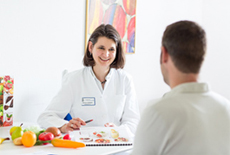Nutrition for cancer:
simple tips instead of dangerous diets

Many cancer diets promise to starve or fight the tumor. But often they themselves are dangerous. Cancer patients can benefit enormously from a suitable diet.
They rely on grapes, vegetable juices or exclusively on raw food, and are supposed to suppress or even cure cancer. Therefore those affected often put all their hopes into such cures. But this is not without risk. "So far, there is not a single diet that can curb or cure cancer. On the contrary, some of the diets can become life-threatening for those affected," warns Professor Dr. Hartmut Bertz, head of the Nutritional Medicine and Dietetics section of the Department of Medicine I (focus: hematology, oncology and stem cell transplantation) at the Medical Center - University of Freiburg, and co-author of the book "Nutrition in Oncology". He has good and simple tips on how, with the right diet, cancer patients can better withstand the disease and the often stressful therapy.
Butter, cream, chocolate – "What tastes good is allowed"
A big danger during the strenuous therapy is weight loss, because the tumor puts the body into a debilitating state of constant alarm. At the same time, many patients suffer from loss of appetite, nausea and vomiting. As a result, the muscles' protein reserves are degraded, further weakening those affected. Therefore Professor Bertz offers this simple advice: "Everything that is tasty and agreeable is allowed," the nutrition expert summarizes.
Protein-rich nourishment, eating sweets and fortifying meals with energy-rich foods like butter or cream can help to retain weight - if they are tolerated. Some people find several small meals more agreeable than fewer large ones. Professor Bertz advises caution with food supplements. "They should only be taken if a deficiency has been identified," he says.
Small changes often help with loss of appetite. Those bothered by the metal taste of cutlery can switch to plastic cutlery. Regular ventilation avoids unpleasant cooking odors, and gentle seasoning is more pleasant for many cancer patients. A detailed consultation with a qualified nutrition expert can help the person affected.
Coffee enemas and vegetable juices: wrong ideas from a different century
Because diets are supposed to improve the well-being and overall health of patients, so-called cancer diets often promise a direct effect on cancer - frequently using outdated or pseudo-scientific ideas.
The founder of the Breuss diet assumed that cancer is caused by blood depletion, and that it lives only on solid foods. Both assumptions have long been disproved. But the diet is still being used. For 42 days only vegetable juices may be drunk. Particularly dangerous is the so-called Gerson diet. In this, a month-long renunciation of fat, meat and salt is recommended, alongside daily "bowel cleansing" via enemas of coffee or tea.
"Both diets are severe malnourishment, and can lead to life-threatening weight loss in tumor patients," says Professor Bertz. Through blood salt shifts, the Gerson diet can cause death. None of the diets has an effect on cancer. Likewise, a long-term low carbohydrate diet, or one based on raw food, are not recommended for cancer patients.
Particularly on the Internet, promises of salvation via specific therapies are often accompanied by recommendations for the purchase of special preparations. Here readers should be particularly skeptical. "Money is often made on victims' fears," says Professor Bertz. Cancer patients who nevertheless wish to proceed with specific nutritional remedies should do so under medical supervision.
Back